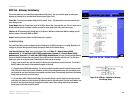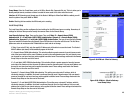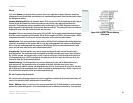
45
Chapter 5: Setting Up and Configuring the Router
VPN Tab - Gateway to Gateway
10/100 8-Port VPN Router
Encryption: There are two methods of encryption, DES and 3DES. The Encryption method determines the length
of the key used to encrypt/decrypt ESP packets. DES is 56-bit encryption and 3DES is 168-bit encryption. 3DES is
recommended because it is more secure, and both sides must use the same Encryption method.
Authentication: There are two methods of authentication, MD5 and SHA. The Authentication method determines
a method to authenticate the ESP packets. MD5 is a one-way hashing algorithm that produces a 128-bit digest.
SHA is a one-way hashing algorithm that produces a 160-bit digest. SHA is recommended because it is more
secure, and both sides must use the same Authentication method.
Encryption Key: This field specifies a key used to encrypt and decrypt IP traffic, and the Encryption Key is
generated yourself. The hexadecimal value is acceptable in this field. Both sides must use the same Encryption
Key. If DES is selected, the Encryption Key is 16-bit. If users do not fill up to 16-bit, this field will be filled up to
16-bit automatically by 0. If 3DES is selected, the Encryption Key is 48-bit. If users do not fill up to 48-bit, this
field will be filled up to 48-bit automatically by 0.
Authentication Key: This field specifies a key used to authenticate IP traffic and the Authentication Key is
generated yourself. The hexadecimal value is acceptable in this field. Both sides must use the same
Authentication key. If MD5 is selected, the Authentication Key is 32-bit. If users do not fill up to 32-bit, this field
will be filled up to 32-bit automatically by 0. If SHA1 is selected, the Authentication Key is 40-bit. If users do not
fill up to 40-bit, this field will be filled up to 40-bit automatically by 0.
IKE with Preshared Key (automatic)
IKE is an Internet Key Exchange protocol that used to negotiate key material for SA (Security Association). IKE
uses the Pre-shared Key field to authenticate the remote IKE peer.
Phase 1 DH Group: Phase 1 is used to create a security association (SA). DH (Diffie-Hellman) is a key exchange
protocol that used during phase 1 of the authentication process to establish pre-shared keys. There are three
groups of different prime key lengths. Group 1 is 768 bits, Group 2 is 1,024 bits and Group 5 is 1,536 bits. If
network speed is preferred, select Group 1. If network security is preferred, select Group 5.
Phase 1 Encryption: There are two methods of encryption, DES and 3DES. The Encryption method determines
the length of the key used to encrypt/decrypt ESP packets. DES is 56-bit encryption and 3DES is 168-bit
encryption. Both sides must use the same Encryption method. 3DES is recommended because it is more secure.
Phase 1 Authentication: There are two methods of authentication, MD5 and SHA. The Authentication method
determines a method to authenticate the ESP packets. Both sides must use the same Authentication method.
MD5 is a one-way hashing algorithm that produces a 128-bit digest.
SHA is a one-way hashing algorithm that produces a 160-bit digest. SHA is recommended because it is more
secure, and both sides must use the same Authentication method.


















